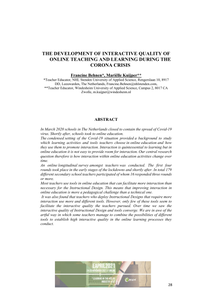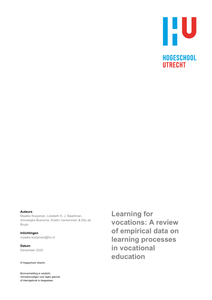Background and aim – In this study, it is pre-supposed that the indoor environmental conditions of classrooms can contribute to the quality of the educational process. Thermal, acoustic and visual conditions and indoor air quality (IAQ) may be extremely supportive in order to support the in-class tasks of teachers and students. This study explores the influence of these conditions on the perceived comfort and quality of learning of students in higher education. Methodology – In a case study design, the actual IEQ of 34 classrooms which are spread over four school buildings in North Netherlands and 276 related student perceptions were collected. The measurements consisted of in situ physical measurements. At the same moment the perceived indoor environmental quality (PIEQ) and the perceived quality of learning (PQL) of students were measured with a questionnaire. Results – Observed are high carbon dioxide concentrations and high background noise levels. A relation was observed between perceived acoustic and visual conditions, IAQ, and the PQL indicating that a poor IEQ affects the PQL. A linear regression analyses showed that in this study the perceived impact on the quality of learning was mainly caused by perceived acoustic comfort. Originality – With the applied innovative measuring instrument it is possible to measure both the actual IEQ as well as the PIEQ and PQL. This method can also be used to assess a reference and intervention condition. Practical or social implications – The applied measuring instrument provides school management with information about the effectiveness of improved IEQ and students’ satisfaction, which can be the basis for further improvement.
LINK
Dit paper is het eindproduct van leerarrangement 1 (Zin in Leren) van de HBO masteropleiding Leren en Innoveren. Het is een literatuurstudie naar blended learning en hoe blended learning kan bijdragen aan een beter leerresultaat van de student.
DOCUMENT

Backgroundand aim – In this study, it is pre-supposed that the indoor environmental conditions of classrooms can contribute to the quality of the educational process. Thermal, acoustic and visual conditions and indoor air quality (IAQ) may be extremely supportive in order to support the in-class tasks of teachers and students. This study explores the influence of these conditions on the perceived comfort and quality of learning of students in higher education.Methodology– In a case study design, the actual IEQ of 34 classrooms which are spread over four school buildings in North Netherlands and 276 related student perceptions were collected. The measurements consisted of in situ physical measurements. At the same moment the perceived indoor environmental quality(PIEQ) and the perceived quality of learning (PQL) of students were measured with a questionnaire.Results – Observedare high carbon dioxide concentrations and high background noise levels. Arelation was observed between perceived acoustic and visual conditions, IAQ,and the PQL indicating that a poor IEQ affects the PQL. A linear regressionanalyses showed that in this study the perceived impact on the quality oflearning was mainly caused by perceived acoustic comfort.Originality– With the applied innovative measuring instrument it is possible to measure both the actual IEQ as well as the PIEQ and PQL. This method can alsobe used to assess a reference and intervention condition.Practical or social implications – The applied measuring instrument provides schoolmanagement with information about the effectiveness of improved IEQ and students’ satisfaction, which can be the basis for further improvement.Type ofpaper – Research paper.
LINK
Lifelong learning is necessary for nurses and caregivers to provide good, person-centred care. To facilitate such learning and embed it into regular working processes, learning communities of practice are considered promising. However, there is little insight into how learning networks contribute to learning exactly and what factors of success can be found. The study is part of a ZonMw-funded research project ‘LeerSaam Noord’ in the Netherlands, which aims to strengthen the professionalization of the nursing workforce and promote person-centred care. We describe what learning in learning communities looks like in four different healthcare contexts during the start-up phase of the research project. A thematic analysis of eleven patient case-discussions in these learning communities took place. In addition, quantitative measurements on learning climate, reciprocity behavior, and perceptions of professional attitude and autonomy, were used to underpin findings. Reflective questioning and discussing professional dilemma's i.e. patient cases in which conflicting interests between the patient and the professional emerge, are of importance for successful learning.
MULTIFILE

In March 2020 schools in The Netherlands closed to contain the spread of Covid-19 virus. Shortly after, schools took to online education. The condensed setting of the Covid-19 situation provided a background to study which learning activities and tools teachers choose in online education and how they use them to promote interaction. Interaction is quintessential to learning but in online education it is not easy to provide room for interaction. Our central research question therefore is how interaction within online education activities change over time. An online longitudinal survey amongst teachers was conducted. The first four rounds took place in the early stages of the lockdowns and shortly after. In total 179 different secondary school teachers participated of whom 16 responded three rounds or more. Most teachers use tools in online education that can facilitate more interaction than necessary for the Instructional Design. This means that improving interaction in online education is more a pedagogical challenge than a technical one. It was also found that teachers who deploy Instructional Designs that require more interaction use more and different tools. However, only few of these tools seem to facilitate the interactive quality the teachers pursued. Over time we saw the interactive quality of Instructional Design and tools converge. We are in awe of the artful way in which some teachers manage to combine the possibilities of different tools to establish high interactive quality in the online learning processes they conduct.
DOCUMENT

from the article: Abstract Based on a review of recent literature, this paper addresses the question of how urban planners can steer urban environmental quality, given the fact that it is multidimensional in character, is assessed largely in subjective terms and varies across time. The paper explores three questions that are at the core of planning and designing cities: ‘quality of what?’, ‘quality for whom?’ and ‘quality at what time?’ and illustrates the dilemmas that urban planners face in answering these questions. The three questions provide a novel framework that offers urban planners perspectives for action in finding their way out of the dilemmas identified. Rather than further detailing the exact nature of urban quality, these perspectives call for an approach to urban planning that is integrated, participative and adaptive. ; ; sustainable urban development; trade-offs; quality dimensions
DOCUMENT

This article reports on a literature review on empirical research investigating learning for vocations in the context of vocational education. We included 36 studies in which learning for vocations is empirically studied. Learning for vocations is characterised based upon prevalent research traditions in the field and framed from the perspective of vocational education and organised learning practices. This framing and characterisation directed the search terms for the review. Results show empirical data on vocational learning and illustrate how learning processes for the functions of vocational education - vocational identity development, development of a vocational repertoire of actions, and vocational knowledge development - actually take place. The review further shows that, empirical illustrations of learning processes that occur in the context of vocational education and organised learning practices are relatively scarce. The findings can be typified in relation to our theoretical framework in terms of three learning processes, that is learning as a process of (a) belonging, becoming, and being, (b) recontextualization, and (c) negotiation of meaning and sense-making. We argue that more empirical research should be carried out, using the functions of vocational education and the three learning processes to better understand vocational learning.
DOCUMENT

The quality of teaching has a clear impact on student success, but how can good teaching be defined? The European QualiTePE research project, funded by the Erasmus+ programme and involving ten European countries, seeks to adress this question specifically for Physical Education (PE). The QualiTePE instrument was designed for use in teacher training and further training to enable criteria-based observation and assessment of the quality of Physical Education lessons. The instrument is designed for diverse PE teaching and learning scenarios, alongside teacher resources, facilitating the practical assessment of teaching quality in PE. The QualiTePE instrument quantifies teaching quality by assessing specific, observable teaching characteristics via questionnaire items. Each assessment is conducted by three different population groups: 1) the students 2) the PE teacher 3) an observer. The comparative analysis of the data collected from these three perspectives enables systematic and criteria‐based feedback for (prospective) teachers, identifies areas of improvement, and informs content development for PE across Europe. The QualiTePE digital web-based evaluation tool for assessing the “Quality of Teaching in Physical Education” is now available in English, German, French, Italian, Spanish, Dutch, Swedish, Slovenian, Czech and Greek.
DOCUMENT

There are lots of definitions of quality, and also of quality in education. Garvin (1984)discerns five approaches: the transcendental approach, the product-oriented approach, the customeroriented approach, the manufacturing-oriented approach and the value-for-money approach. Harvey and Green (1993) give five interrelated concepts of quality as: exceptional, perfection (or consistency), fitness for purpose, value for money and transformative. A new definition of quality is needed to explain recent quality issues in higher education. This article describes a quality concept with four constituents: object, standard, subject and values. The article elaborates on the values. Four value systems derived from Beck and Cowan (1996) are transformed into four value systems on quality and quality management: control, continuous improvement, commitment and breakthrough. These value systems make it possible to explain some recent developments in quality management in higher education.
DOCUMENT

To adequately deal with the challenges faced within residential care for older people, such as the increasing complexity of care and a call for more person-centred practices, it is important that health care providers learn from their work. This study investigates both the nature of learning, among staff and students working within care for older people, and how workplace learning can be promoted and researched. During a longitudinal study within a nursing home, participatory and democratic research methods were used to collaborate with stakeholders to improve the quality of care and to promote learning in the workplace. The rich descriptions of these processes show that workplace learning is a complex phenomenon. It arises continuously in reciprocal relationship with all those present through which both individuals and environment change and co-evolve enabling enlargement of the space for possible action. This complexity perspective on learning refines and expands conventional beliefs about workplace learning and has implications for advancing and researching learning. It explains that research on workplace learning is itself a form of learning that is aimed at promoting and accelerating learning. Such research requires dialogic and creative methods. This study illustrates that workplace learning has the potential to develop new shared values and ways of working, but that such processes and outcomes are difficult to control. It offers inspiration for educators, supervisors, managers and researchers as to promoting conditions that embrace complexity and provides insight into the role and position of self in such processes.
DOCUMENT
